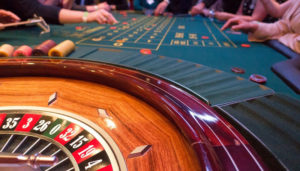Las Vegas Gambling Tips – Playing Big Pairs in Tournaments — Part One
Las Vegas Gambling Tips: Playing Big Pairs in Tournaments — Part One
On The Town With Vegas Vic
By: Victor H. Royer
Welcome to Las Vegas! My name is Victor H. Royer, but everyone just calls me Vegas Vic. I was named after that famous neon sign in Downtown Las Vegas, that cowboy with the hat on top of the Pioneer Club, always waving his hand and beckoning to his long love, Sassy Sally, on the other side of the street. I will be writing a few articles for AccessVegas.com, so I hope you enjoy them.
Playing Big Pairs in Tournaments — Part One
Over the next series of articles, I am going to ask you to consider some of the big pairs in Poker and how you should (could) play them in poker tournaments. As odd as this may seem, there are many different ways in which you can (or should) play big pairs, including pocket Aces. This also includes hands like Ace-King. Many players think (feel) that these are the kinds of hands that play themselves. While it may be OK for you to play like that at home, that’s not what you should (ought) to do in poker tournaments. Even big pairs like Aces aren’t always candidates for the same kind of consideration, and most certainly so for poker tournaments. So, here we are going to explore some of the possibilities, and some of the reasons for them. In the game of Texas Hold’Em there are four pocket pairs that can be considered in the classification of “big pairs”. These are, in their order of importance:
- Ace-Ace
- King-King
- Queen-Queen
- Jack-Jack
Pocket Aces is the best hand, and for good reason. Not only can this hand win unimproved, but it has a multitude of possibilities for making a variety of other hands that can also turn into winning hands. Statistically, pocket Aces win about one third of the time. This is one of those readily understood quirks of this game, and the statistics that apply to it. Many people consider it as a given that whenever they get pocket Aces they should immediately win the hand. Although indeed it is the best hand prior to the flop, a whole lot of things can happen on the flop, and on the turn, and on the river, that can very quickly and easily counterfeit those pocket Aces and consequently turn something that looked very good at the beginning into something that quite often has to be thrown away, or will lose.
What many players don’t realize, and not just novices, is that if we are to accept the statistical models that guide the various percentages relative to such hands in the game of Texas Hold’Em, pocket Aces is a hand that will actually lose two thirds of the time. Therefore, although you are a very significant favorite in the hand when you begin with pocket Aces, if the situation was left purely to the statistics and no other considerations brought to bear, you would find yourself winning one third of the time with them, and losing the other two thirds. This would not make the hand profitable. However, the good thing about poker is that we as players do not have to rely purely and only on the statistics, nor do we have to play the hand out as if it was a computer simulation designed to provide statistics based on the frequency of occurrence of potential wins relative to the occurrences of other events that counterfeit them.
As poker players we have the ability to be able to play the hands in a manner in which they can win even if statistically they would be favored to lose given the circumstances on the flop and thereafter. This is what separates purely the statistics from the actual playing of poker as a game played by humans against other humans, with the objective of winning money. Statistics and statistical testing programs do not take that into account, and no computer will take into account the abilities and skills of the player, nor understand the concept that the acquisition of tournament chips in the process of playing is an objective and the goal, and that such objectives and goals are the winning of money. Therefore, the theories of the game do not necessarily always reflect the fact that human beings have abilities that transcend the theory, as well as goals and objectives that are inherently unable to be part of such theories and consequently inapplicable thereto.
All these are considerations that often escape a great many poker players, and as a result many players do not play such big pocket pairs always to their advantage, or necessarily as well as they could given the various situations and circumstances to which they can apply. I will, therefore, now offer a few guidelines that you can use as the basis and building blocks to form your own strategies based upon the remainder of the rest of your arsenal of skills and abilities as such apply to your goals and objectives in Texas Hold’Em poker tournaments. But remember that these are guidelines designed to work under the best of circumstances, and that ultimately whether or not you personally will be able to play them that well, or to apply such recommendations alongside the remainder of your skills and abilities as successfully as possible, very significantly depends on precisely what kind of a poker player you are, and exactly how well you can do so. But by at least being aware of these guidelines this should provide you with the ability and framework upon which to build such success, because you will at least be aware of the most common circumstances in which such hands should be played in accordance with these recommendations.
I also again remind you that this entire discussion is concerned with the playing of poker tournaments. Consequently, it is equally as important to remember that some ways of playing big pairs are better suited to such tournament strategy, while others are not. Similarly, what you may do with big pairs in cash games will (may) also be different to what you would (could) do with the same hand under similar conditions in tournaments. Whenever you receive pocket Aces it is always exciting. You know that you have the best starting hand in Texas Hold’Em, and at the same time also a hand that is quite likely to win you a very nice pot. However, it is easy to be blinded by this hand, resulting in either one of two very common mistakes:
- Overplaying pocket Aces.
- Underplaying pocket Aces.
In the first instance the excitement may get the better of you and you will make your bet much too big relative to the action. Most often such bets are too big relative to the blinds and the investment in the pot up to that point. The result is making continuation plays more difficult, if not impossible, for those opponents whom you wanted to play with you. The outcome of this, of course, is that you win a small pot when you should have won a bigger pot. In the second instance the converse to this is true. In such situations players often do not bet enough and as a result they let too many of their opponents in relatively cheaply, a situation that can very easily occur when the blinds and antes are such that the small raise you made is thus relatively inexpensive for them to call. The outcome of this is probably the most unfortunate and inadvisable scenario, and that is that your pocket Aces will now be facing a field of several players. What happens in this situation is that you are either likely to win a relatively small pot, but at the same time risk losing a big one.
There is an old saying in poker that goes something like this: “Small-betting or slow-playing pocket Aces wins small pots, but loses big pots.” This is very true and you should learn not to do this, because otherwise you will find it out the hard way and can think about this concept as you make your way out of the door having been busted out of the tournament. This mistake is very common and can quite easily be committed by a variety of players with different skills at any time, or stage of the tournament. Just remember that any time you let other players in cheaply, your big pairs are always vulnerable, even if they happen to be pocket Aces. Therefore, the lesson to be learned here is that you should always play pocket Aces aggressively, and raise a sufficient amount that will either isolate you against only one opponent, or possibly no more than two, while at the same time making it incredibly expensive for them to continue to play with you.
Simply put, whenever you have pocket Aces and decide to make a play with them — which you should almost always do — be prepared to go with them all the way. Remember that whenever you are the aggressor, especially when you hold this big pocket pair, you should make your move as boldly and as early as possible, not only to isolate yourself against preferably only one opponent, but hopefully to win the pot right then and there, especially if it had been reraised by your opponent, or perhaps a second player coming in thereafter. When you have pocket Aces now is not the time to try to be fancy. Especially so in the early rounds of the poker tournament, because you should always remember that sophisticated plays are often quite lost on mostly unsophisticated opponents. So when you have a hand like this go for it with the gusto that such a hand demands, unless — and this is its only caveat — you have made other determinations subsequent to the flop in which it becomes plainly obvious that your hand is no longer the best, and is unlikely to become the best. This is a difficult judgment to be made especially in circumstances where the play to continues to the flop, because no matter how good your hand may be at the beginning before the flop happens, each time there is an opponent facing you after the flop it is quite possible that he or she can out flop you and thereby completely destroy or invalidate your good hand and good play prior to the flop. But those are situations and considerations that you will have to make if and when you actually do get to the flop without having gone all in prior to it.
In all circumstances where you hold pocket Aces and you make a raise prior to the flop and are subsequently reraised by another player, always be prepared to move all in right then and there. Most of the time this will result in you either winning the pot immediately, or, which may be preferable but is nevertheless dangerous, you will get that player committed to playing the pot with you. In such circumstances it is usually the case that your opponent has another big pair, or at least another pair, and sometimes even a drawing hand such as Ace-King, suited or offsuit. In all of these circumstances your pocket Aces are of course always the favorite, until the flop.
But in each of these situations there is always the possibility that no matter what hand your opponent has chosen to play against your pocket Aces, his or her hand may actually hit the flop while yours does not, or perhaps hit the flop better than your hand possibly can. That is the vulnerability in playing pocket Aces, and indeed any pocket pair, although pocket Aces are the most vulnerable to lucky flops by opponents who have decided to take action with you. Consequently, whenever you have pocket Aces be prepared to play big pots rather than small pots. Pocket Aces is a hand that should be played for big pots, and not a hand that should be nickel-and-dimed.
Even though there are many cases in which a situation will dictate that you use the hand for the purposes of trapping your opponents into overcommitting, those circumstances are such as you will be able to decide and determine based upon your observational skills as they apply to that particular play in that moment and at that table and against those opponents. But as a general suggestion, always try to play pocket Aces for big pots, and not small ones. Of course the second caveat to all of this is when you are in situations where the play of your pocket Aces will be more profitable as a trapping hand. Most of the time such situations will present themselves when you receive pocket Aces in early and middle positions, or the blinds. More on this next time.
Victor H. Royer, known as Vegas Vic, is the author of 42 books. Mostly known for books, articles, and columns on casino games and gambling, he is also the author of New Casino Slots, Great Gamblers: True Stories and Amazing Facts, The Great American Joke Book, as well as his works of Fiction, which include: Another Day, and the Western: Riders on the Wind. Versatile and multitalented, Royer is the creator, producer, and host of the Web-TV show Great Casino Slots, now showing at www.LasVegasLiveTV.com. He also composes music and performs under the names Glenn Diamond, Pappy Jones, Hans Dorfmann, and Miguel Armandaiz. For more information, please visit him at www.MoreCasinoDeals.com and www.GamingAuthor.com. Sign up for the Insider Advantage Newsletter at: http://www.accessvegas.com/old-access/membershipvr
His books can be ordered through this website, by following the links provided
(c) Copyright 2016 Victor H. Royer. All rights reserved. For syndication purposes, contact GSR Holdings Inc. at: [email protected]







